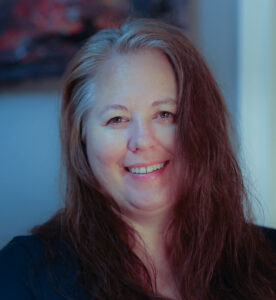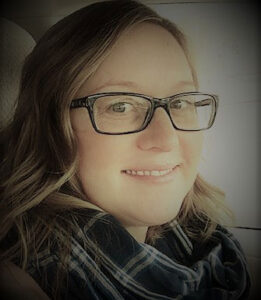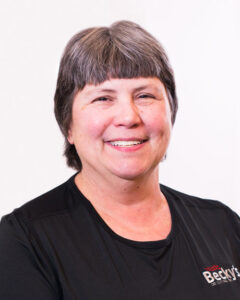
By Hallie Forcinio, writer, PostPress
Like most businesses today, print finishing companies are having a hard time hiring entry-level (and above) workers. There are no easy answers to attracting and retaining talent, but one option is to encourage women, especially young women, to apply for positions in this traditionally male-dominated field.
In interviews with PostPress, a trio of women who are top executives at small, family-owned print finishing companies reminisce about how they found their way into the industry and discuss how others might follow. During the course of their careers, each woman has done virtually every job on and off the shop floor. Some continue to spend time on the shop floor today.
Each of the executives stress the importance of operator-friendly equipment and how print finishing offers the potential to begin forging a lucrative, lifetime career right out of high school.
How did you get started in the print industry?

Sonja Nagy, vice president, Texas Bindery Service in Cedar Creek, Texas: I got my start working with my dad at the shop when he needed help in the summer and on weekends. Dad (Keith Nagy) had been the president of a multimillion-dollar printing company and left to start his own trade bindery business in partnership with his sister (Sheila Nagy). My brothers and sisters and I grew up in the business.
I started out as a bindery helper. I enjoyed working with my father and always felt a responsibility to help make things easier for him. While supporting his dream, I found a place for myself in the printing and finishing industry. In 2006, my father and my aunt decided to end their partnership, and my father, brother and I founded Texas Bindery Service.

Becky Almeter, president, Hodgins Engraving, Batavia, New York: My business is a family business, started by my grandparents and continued by my father. I took over when my dad retired. As a young person, even through college, I had no intention of joining my father’s company. However, as life happened, I ended up moving back to the area and finding that it was a natural fit for where I was in my life at the time. The things that drew me back to the area are the same things that drew me back to the business: the importance of family and community, making an impact in a place that means a lot to many other people, taking pride in your work and surrounding yourself with people that mean a lot to you.

Becky Garrison, president, Becky’s Diecutting, Fort Wayne, Indiana: I’m very hands-on. I’m a country girl who grew up on a farm and learned how machines work from a mechanically inclined dad. My first job was with a start-up company. I was 18 and newly married when a neighbor asked if I wanted a job, and my husband said if I wanted to do it, I should do it.
The shop was producing sun-visor-like paper hats, which were cut on a clamshell diecutter. After two days, I asked Keith Sipe, the owner, if I could run the hand-fed machine. Shortly after, he began teaching me about the diecutting business. A few years later, after having two small boys, the ownership of the shop changed and the workload forced me to struggle with being a good employee or being a great mother. I wanted time with my family, so I told the boss I was quitting but offered to stay for six weeks or even a year. However, I was escorted out of the building and he immediately began calling customers to advise them I was no longer with the company. By the time I arrived home, I had several messages with job offers.
Knowing that people wanted to hire me, a friend of mine suggested that I should think about starting my own business. There were three customers that wanted to start a co-op and wanted me to run it, so I made the decision to start my own business without any outside help. I sold a knitting machine and bought my first Kluge. Although I didn’t accept their offer at forming a co-op, we still do business to this day with those same clients. The business has grown into a close-knit family of employees and customers. If you mention Becky around Fort Wayne, everyone knows me.
What roles have you had in your company?
Nagy: My current title is president, but I’ve served in every role at one time or another and continue to pitch in wherever needed. In a small company, it’s all-hands-on-deck when a job has to be shipped. My success stems from doing the best I can do every day.
Almeter: When I was a teenager, I worked in the production area and shipping during summer break, never anticipating that it was anything more than gas money for the summer. When I returned home after college, I began working as a customer service rep. From there, I got into attending some of the tradeshows and working on marketing projects, which I loved. I really enjoyed speaking with customers and potential customers about what we do and thinking more strategically about the products and services we offer and how to market them.
I got more and more involved in management from there. I managed the Customer Service team and, for a brief period, filled a vacancy in the production manager role where I scheduled jobs, staged work for operators, managed the finishing team, etc. I’ve worked in most areas, except pre-press, in some capacity over the years, and those experiences have proven to be invaluable as we prepared for my father’s retirement and for my assuming my current role as president.
Garrison: I’ve done everything in the company – billing, estimating, press operation, die ordering, foil stamping and embossing. My title is president, but I’ve turned the office over to my younger son. All the customers know and respect him. I’ve come full circle and spend most of my time on the shop floor. I still help my son and the production manager with die ordering and project planning so samples, dies and paperwork are completed in a timely fashion and the job progresses efficiently, but I love to run presses and can tell from across the room if a machine isn’t running right.
What role has a mentor played in your career?
Nagy: I’ve worked closely with my father for most of my adult life, and I worked with my Aunt Sheila early in my career and have always looked up to her. She worked in the industry for a long time and succeeded in what was a male-oriented and male-dominated industry. I’ve had the benefit of learning from their experiences.
Almeter: My strongest mentor has been my dad because he has been intently focused on my success and the future success of the company, instead of just looking toward retirement and hoping for the best. He has shared his perspective and experience while, at the same time, letting me forge my own path and figure things out for myself. He’s been a great example of how to be strategic and adapt to change, how to keep the big picture in mind and keep your focus on what’s important. He’s a person who always is ready to lend an ear and seems to always have the right advice, right when you need it.
There also are employees here who have watched me grow up and have been an invaluable resource. Although I was new to the leadership role, the team already in place enabled me to take on the challenges of the economy and the pandemic. Karen Kelley technically fills the roles of AP/Accounting/HR with our company, although, in reality, she is one of the people that you can find filling in anywhere a hand is needed. Karen has mentored me through my growth as a leader by allowing me to come to her with anything – when I don’t have answers, to admit my struggles, to ponder difficult situations – and to just be a wonderful friend and moral support. Her perspective has guided me through many difficult decisions.
Garrison: My dad has been my primary mentor and taught his five kids how to work hard. Four of the five siblings now are business owners. Dad owned a business and taught me finances and business realities, like you don’t stand around with your hands in your pockets.
Keith Sipe, my first boss, was another big influence. He was very particular and detail oriented. When you have that attitude, people know what you expect. One more influence was my grandma. When I was a kid, I made a mistake on an afghan I was crocheting. She ripped it out and made me rework that part. “If it’s worth doing, it’s worth doing right,” she said.
How do we get more young women involved and interested in manufacturing?
Nagy: We need to provide opportunities for women to learn that print finishing is not just a job, but a valuable career in which they can excel. This industry has opportunity and growth potential available to anyone who is willing to put the work into it.
Almeter: I believe schools need to promote trades and all aspects of manufacturing more to the graduating students, especially women. You typically hear about trade or manufacturing positions that are entry-level production positions, often presented as an alternative to college and aimed at young men. However, the support, administration, marketing, sales and leadership roles in these fields also are great options that might evolve from an entry-level position for someone with dedication and ambition. Many people who have been at our company for 20-plus years started on the shop floor in shipping or finishing and moved on to other roles.
Also, I think it’s important for schools to dispel the commonly held belief that going into a trade or going to college is an “either/or” choice. Getting a manufacturing job could fill a “gap period” between high school and college that could give young people time to think about what they want to achieve with higher education. Many companies can structure the working environment so that employees can attend school part-time. These are the messages that I believe young people need to be hearing, especially in times of economic uncertainty and turmoil. Beginning in manufacturing can be a stable, sensible starting point for a career that might evolve in many directions.
As we know, the field of printing and finishing has traditionally been dominated by older, white men. It’s my belief, and my company is proof, that as these men age out, they’re not going to be replaced by older white men. The people that are coming up into the industry are going to be more representative of the population in general, including women and minorities. I can’t speak for other companies, but I always look for employees who have work ethic, positive attitude and want a career, and then I train that individual in the specifics of our industry. That hiring philosophy has led to an evolution of our employees more broadly representing the population.
Garrison: I would like to see more women in production. They can make good money. Perhaps there needs to be program where people could come see what we do. I wish I knew how to reach high school freshmen or sophomores for an after-school job so they could learn about career options that don’t necessarily need a college degree. I have nothing against college, but I don’t believe everyone needs to go.
What’s the biggest challenge facing the print finishing industry and how are you solving that challenge?
Nagy: I try to be a cheerleader and provide opportunities for individuals to see firsthand the growth potential that is available in this industry. Most people aren’t aware of the print finishing industry or the long-term career possibilities available. A newcomer is only limited by how much effort he/she is willing to exert.
Almeter: In the current slice of time, economic turmoil is our biggest challenge as it comes with a host of issues including decreasing sales, reduced pool of potential employees, higher raw material costs, disrupted supply chains and, in general, a more stressful workplace (and life, too!). I hope that the worst of these challenges prove to be short-lived, but I do believe the pandemic has forced many companies to re-evaluate, re-focus and re-invent themselves to some degree.
However, asking this question in another six months or a year could very well generate a different answer, so a big challenge is simply that it’s tough to forecast, predict and plan. The most important thing seems to be resilience to overcome short-term challenges while positioning to adapt in the long-term. For our company, we have dramatically increased our efficiency and are going through the process of re-evaluating who we are, what we do, what’s important to our customers and where our potential lies to create a vision of what we could be in the future. I’m looking forward to announcing our new brand and rolling out additional e-commerce resources early in 2022!
Garrison: People used to go through apprenticeships and learn about the business. That doesn’t happen now, and people don’t understand how the machines work. People think with digital printers all you do is press a button and the job is done. They don’t understand alignment and registration issues or know how to select the proper die for a job.
Perhaps one way to attract people is with better equipment. We run Bobst diecutters and just bought a brand-new EcoSystems laminator from Italy. It’s the fastest in the area and automates the infeed and outfeed so only one person is needed to monitor the machine to make sure the sheets are moving through it.
What motivates you to get up each morning, excited to come to work?
Nagy: I love the creative problem-solving aspects of the business and coming up with ideas to create interesting and unusual finishes and products. Whether it is a print finishing solution, a production solution or a design solution, I really like being able to share my expertise and help customers develop a solution that makes them happy. I find a sense of fulfillment in project completion. Another big thing for me is to support the team. I’m not as hands-on anymore, but there always are questions that need answering. I like to be available to provide whatever information is needed.
Almeter: I am motivated because we are an amazing team producing awesome work. I have a building full of people who are working with heart, collectively producing fun, complex, amazing work every single day. I also enjoy problem solving, strategizing and working on continual improvement – which I have a chance to do every day!
Garrison: I love being a press operator and I’m thrilled when I go out in public and see a job we’ve done. I’d rather be here than anywhere else. If someone told me I could go to Hawaii for a month or go to work, I’d probably come to work. We’re family here, and I love this industry.
The Texas Bindery Service is a family business with 10 employees, including four women, which opened in 2006. It offers a complete array of bindery options, raised spot ultraviolet lamination, embossing, index tabs and digital foiling. It also runs two digital presses to serve the short-run book market and print-on-demand projects.
In addition to engraving, Hodgins Engraving, which employs a workforce of 24 with 15 women, offers traditional and digital offset printing, foil stamping, thermograph, variable data printing, letterpress, specialty finishing. It also produces dies and rubber stamps and supplies direct mail and design and consulting services.
As the name implies, Becky’s Diecutting specializes in diecutting. The company, which has 12 employees including three women, runs a variety of paper and plastic materials to produce brochures and other collateral. Other capabilities include micro-perfing and foil stamping particularly on bags and boxes for cannabis products.

